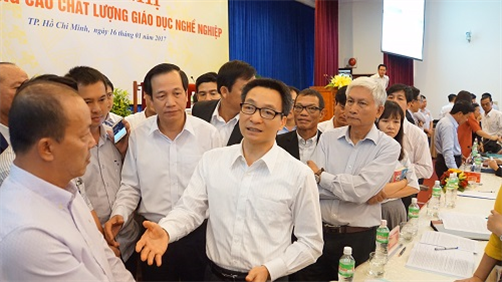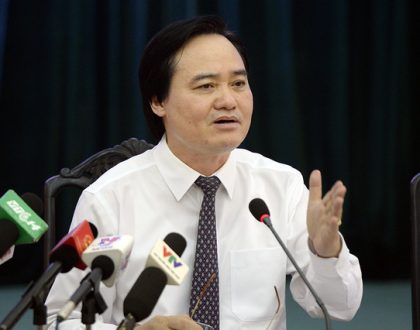In recent times, many Valued Customers and Members have certainly been confused and concerned about the new salary policies applied to teachers starting from 2020. Are these pieces of information accurate? How will teachers' salaries be calculated starting from 2020? Thu Ky Luat would like to answer all of the Valued Customers’ concerns in the article below.
See more: There will be a separate bonus fund for teachers at all levels from 2021

Teachers receive new salaries starting from 2020: All related inquiries addressed (Illustrative photo)
 SALARY CHART FOR TEACHERS AT ALL LEVELS FROM JULY 1, 2020
SALARY CHART FOR TEACHERS AT ALL LEVELS FROM JULY 1, 2020
In this article, Thu Ky Luat would like to address 5 issues that recently have been the most frequently asked by our Clients and Members, specifically:
- From 2020, when the standard training level for teachers at all levels is raised according to the new standards, how will teachers' salaries be calculated? Will it change or not?
- Is it true that from 2021 the statutory pay rate will no longer apply to teachers in particular and officials and public employees in general?
- Is it correct that from 2020, teachers’ salaries will be paid according to job positions and the complexity of the work? And how will this payment method work?
- Is it true that from 2020 the tenure allowance and some other types of allowances for teachers will be abolished?
- If the tenure allowance is abolished, will there be any replacement allowances for teachers?
THU KY LUAT will address each issue as follows:
1. From 2020, when the standard training level for teachers at all levels is raised according to the new standards, how will teachers' salaries be calculated? Will it change or not?
As Thu Ky Luat has informed our Clients and Members, from July 1, 2020, the training standard for teachers at all levels is raised compared to the regulations in the Education Law 2005, specifically:
- For preschool teachers: Must have a college degree in pedagogy or higher (The current requirement is only a diploma in secondary pedagogy).- For primary, lower secondary, and upper secondary teachers: Must have a bachelor's degree in pedagogy or higher (The current requirement is a diploma in secondary pedagogy for primary teachers; a college degree in pedagogy or a bachelor’s degree with a pedagogical training certificate for lower secondary teachers).
In cases where the subject lacks teachers with a bachelor's degree in pedagogy, the teacher must have a bachelor's degree in a relevant discipline and a pedagogical training certificate.
It can be seen that raising the training standard to a university level aligns with the spirit of Resolution 29-NQ/TW which states “Moving towards all primary, secondary, and vocational education teachers and lecturers having university-level education or higher, and possessing pedagogical skills."
So, does this change in training standards affect teachers' salaries? Thu Ky Luat answers: Yes. Currently, teachers’ salaries, as public employees, are determined by the job title they are recruited into. New teachers start with the lowest job titles, thus receiving the lowest salaries. At present, the Education sector does not have a separate salary scale, but raising the training standards for preschool, primary, and secondary teachers serves as a basis to start the salary steps for these levels, logically resulting in an increase - according to Mr. Hoang Duc Minh, Director of the Teacher and Educational Management Personnel Department (Ministry of Education and Training).
He also indicated that the new salary calculation method is expected to eliminate the concept of basic salary, replacing it with a starting salary amount which is then translated into higher levels. By starting with a monetary salary and transitioning through levels and training standards, preschool, primary, and secondary teachers’ salaries will rise compared to the current system, especially for new teachers.
For primary level, teachers' training standards will be raised from secondary to university, making it the level with the most significant change in salary. Currently, the initial salary with a secondary level is coefficient 1.86, while the university level is 2.34, highlighting the substantial increase in primary teachers’ salaries.
2. Is it true that from 2021 the statutory pay rate will no longer apply to teachers in particular and officials and public employees in general?
Thu Ky Luat confirms that from 2021, teachers who are public employees will no longer be paid based on coefficients and the statutory pay rate. Instead, their salaries will be stated as specific amounts in the new salary chart.
To be specific, according to Section 3.1.c Part II of Resolution 27-NQ/TW, the statutory pay rate will be abolished, and specific salary amounts will apply to officials and public employees based on job positions.
Additionally, Resolution 27-NQ/TW sets a roadmap for salary increases for officials and public employees from 2021 to 2030, with the following changes:
- In 2021, the lowest salary for officials and public employees will equal the average lowest salary in the enterprise sector.- Periodically adjusting the salary to align with consumer price indices, economic growth, and state budget capability.- By 2025, the lowest salary for officials and public employees will be higher than the average lowest salary in the enterprise sector.- By 2030, the lowest salary for officials and public employees will be equal to or higher than the highest salary in the enterprise sector.
3. Is it correct that from 2020, teachers' salaries will be paid according to job positions and the complexity of the work? And how will this payment method work?
Thu Ky Luat answers: Yes. To be specific, according to Article 76 of the Education Law 2019, teachers' salaries will be aligned with their job positions and professional labor, and they will be given priority for occupational allowances according to government regulations.
Starting from 2020, teachers will receive salaries based on job positions and the complexity of their work, in line with the salary policy reform spirit of Resolution 27/NQ-TW of the Central Executive Committee.
There will be specific professional salary tables for officials and job titles of public employees applied uniformly to officials and public employees who do not hold leadership positions; each official's grade and public employee's job title will have multiple salary levels based on the principle:
- The same level of job complexity will have the same salary.- Higher than normal working conditions and professional advantages will be addressed with occupational allowances.
4. Is it true that from 2020 the tenure allowance and some other types of allowances for teachers will be abolished?
According to Resolution 27/NQ-TW, the tenure allowance for professions (except military, police, and confidential departments to ensure salary correlation with officials) will be abolished. This means the tenure allowance for teachers will no longer exist. According to Mr. Hoang Minh Duc, the tenure allowance currently shows the difference between newly hired employees and long-serving employees. The new spirit of allowances will not follow longer service, higher allowance. Teachers' income will reflect the complexity and specificity of their work.
In addition, according to Resolution 27, the following allowances will also be abolished:
- Occupational preference allowances (as this will be combined with responsibility allowances and hazardous, dangerous allowances into occupational allowances).- Attraction allowances (as this will be combined with special allowances and long-term working allowances in difficult socio-economic regions into allowances for working in special difficult regions).
5. If the tenure allowance is abolished, will there be any replacement allowances for teachers?
According to Resolution 27/NQ-TW and Education Law 2019, from July 1, 2020, teachers will no longer receive the tenure allowance.
However, the state will also implement new salary policies and other allowances for teachers, specifically:
- Implementing new salary scales with specific amounts, abolishing the statutory pay rate and current salary coefficients.- Prioritizing teachers for special occupational allowances according to government regulations.- Salary based on job positions and professional labor.
Additionally, teachers working in regions with particularly difficult socio-economic conditions, special schools, and gifted schools, as well as schools for the disabled, will also enjoy preferential policies and other allowances according to government regulations.
Nguyen Trinh
 Article table of contents
Article table of contents





.Medium.png)
.Medium.png)
.Medium.png)
.Medium.png)
